When driving around the backroads of Co Tipperary the last thing you’d expect to find is a busy working woollen mill. But 1km or so outside the village of Ballycommon you’ll come across the Ballyertella Woollen Mills which has been operating on the site since 1893. 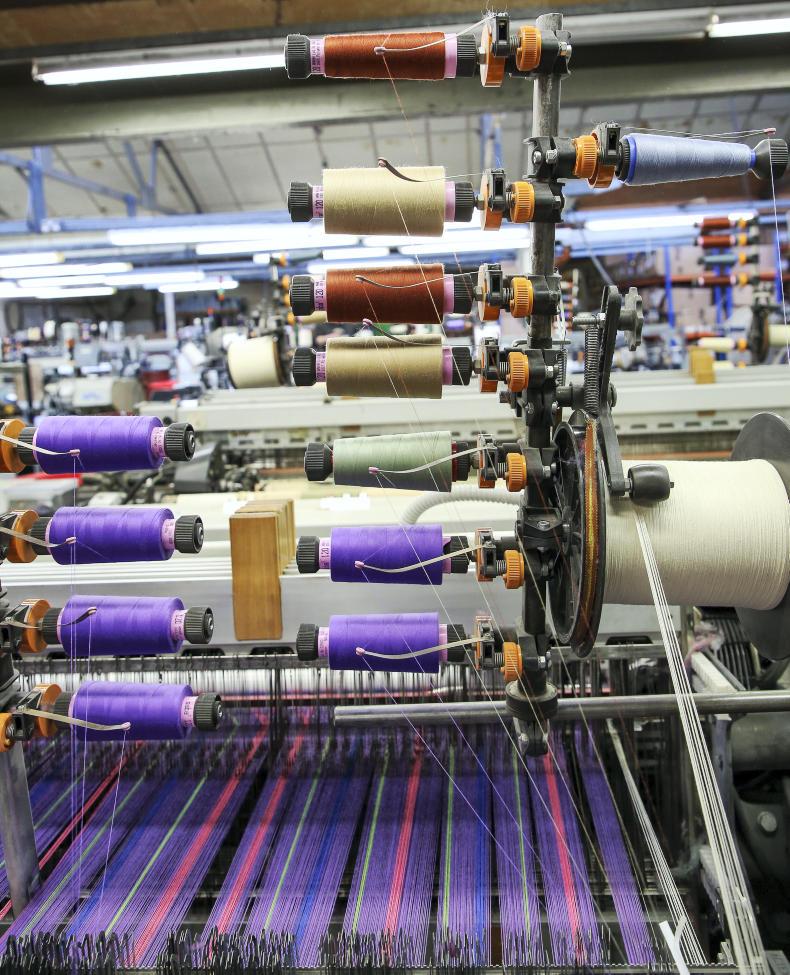
Brian Hanly is the fourth generation of the family to run the business which still carries the name of his great-grandfather – John Hanly and Co.
Key dates in the history of the mills include 1893 when Denis Hanly and his son John started spinning, weaving and finishing woollen products at the site alongside the River Nenagh. In 1910 they began exporting to the UK and Europe. In 1938 the original water mill was replaced with an electricity generating turbine.
Then in 1950 disaster struck when a fire destroyed much of the mill including its yarn-spinning facility.
“That was a defining point for the business. Up to then, we’d been an intake point for farmers from all over the country who sold us their wool. It took a lot of work to get that wool into shape for spinning and after the fire we stopped doing it,” says Brian.

The mill continued to weave various blends of fabrics for Irish and European manufactures and having survived two world wars, a great depression and much more, the pressure didn’t let up. Ireland’s accession to the EU in 1973 created a whole new set of challenges with mounting pressure from foreign imports.
“There’s probably no more than a dozen woollen mills in the country and each had to re-invent itself to survive,” says Brian.
Re-invention
In the case of Hanly’s that meant switching the focus of the business from fabrics to accessories. Not an easy thing to do when 80% of your business is weaving fabrics.
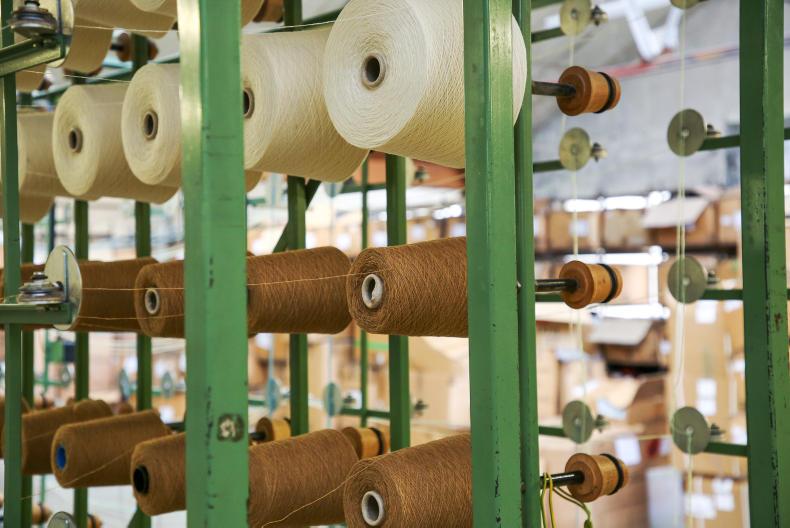
But they succeeded, and today the figures are reversed with 80% of business now coming from throws, scarves and headwear. The balance is in woven fabrics. A massive 99% of sales are business to business with 52% of sales coming from the Irish market and the balance from exports. They also sell through the factory shop and there’s value to be had with their annual sale which runs through the whole month of February.
Hanly’s only use wool and cashmere as their raw materials. They are sourced from suppliers who produce these materials in a sustainable and ethical manner.
Hanly’s continues to evolve and over the past 12 months has completed a rebranding of the look and feel of the business. That’s included a new website, logo, tags and labels. Photoshoots with the Tipperary landscape in the background and using local models all added to the authenticity and heritage of the product and business.
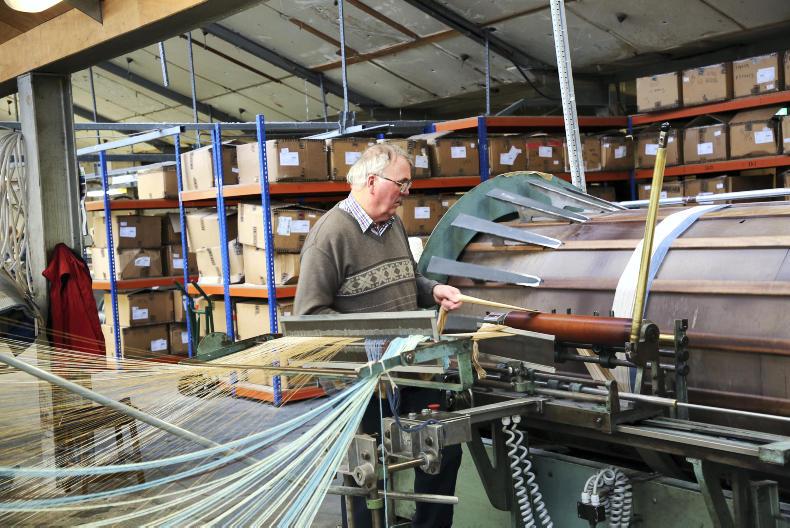
Fabric in the making. \ Odhran Ducie
Designers create each collection with its own weave, colour combination and patterns. The colours of this season have been duck-egg blue and baby pink woven in a herringbone pattern. The throws were hugely popular this year. “These throws in neutral pastels fit in with a modern style of living and create that cosy, comfortable and warm feeling which the Swedes call ‘hygge’.
“The US market is strong with the diaspora looking for an Irish feel to what they buy. The home tourist market look to bring home a memory of their visit and prefer plaid and check patterns.”
New challenge
Brexit is the latest challenge facing the business. “We are getting on with it. Sales were hit after the referendum as the confidence of independent UK businesses was shattered. 
It will be hard to see how a trade deal can be achieved by the end of the year. We can deal with VAT issues but it’s logistics, paperwork and customs that’s a worry,” says Brian.
In addition, all the fabrics produced at Hanly’s are finished and made ‘needle ready’ by an independent finisher in Scotland. “We dispatch fabric twice a week and it travels through Northern Ireland and Scotland and back again. How that is going to be treated by customs we do not know.”
But with almost 130 years of experience coping with wars, recessions and depressions behind them, Hanly’s won’t let a thing like Brexit get in the way of the history they still have to write.
Brian Hanly was aged just 24 when he came home to the business in 1985. “I was given a sort of ultimatum to return. My father needed one of us to help him run the business as he had suffered a minor heart attack. I was doing accountancy exams at the time and I well remember my boss saying to me, ‘You need to go home’. Dad’s commitment to the mill was unreal. He worked here until six months before his death at the age of 88 in 2013.”
But as is the case with so many who return home to farm, Brian was no stranger to the business. “Our family home was right beside the mill. I’d been in and out of the place from the time I was three years old. I did my homework in the office, spent most school and college holidays here. You wouldn’t get away with it now with all the health and safety regulations”.
Brian has three children who are all in their 20s and he is adamant that none of them will return to manage the mills out of a sense of duty or sentimentality.

“Returning home is open to any, all or none of them. It will be their decision, a decision they make with the full knowledge of the challenges facing the business. You have to be able to make a living and you are responsible for the livelihoods of 32 people. That’s a heavy responsibility.”
Super star support
Support for woven headwear can come from the most unusual sources. In the case of Hanly’s, it’s the likes of actor Cillian Murphy and how he is styled wearing their eight-piece woven cap on the hit series Peaky Blinders.
Hollywood heart throb Ryan Reynolds is a fan of Hanly’s quintessentially Irish ‘flat cap’. In a recent interview with the New York Times he said he’d had one for 15 years and still loves it. “My wife would kill me if I ever got rid of it.”
Many of the 32 people working in Hanly’s have been with the business for a very long time. Take Eileen McLoughney and Kathleen O’Connor who have been with Hanly’s for 42 and 40 years respectively. Both are menders, which involves picking up stray threads in the fabrics. God bless their eyesight.

Menders Elaine McLoughney and Kathleen O'Connor at work. \ Odhran Ducie
“Hanly’s has been good to me,” says Eileen who as well as mending does bespoke embroidery on commissioned pieces.
“I only live five miles away so it’s very handy.” Kathleen says it’s great to get up in the morning and have something to do, especially when it’s something you are good at.
Mary Kelly has worked with Hanly’s for 20 years and her job is to sew labels on to everything. “I live three miles away and it’s great to have work so close to home.” Other roles in the mills include weavers, warpers, menders, knotters, fitters, machinists and designers.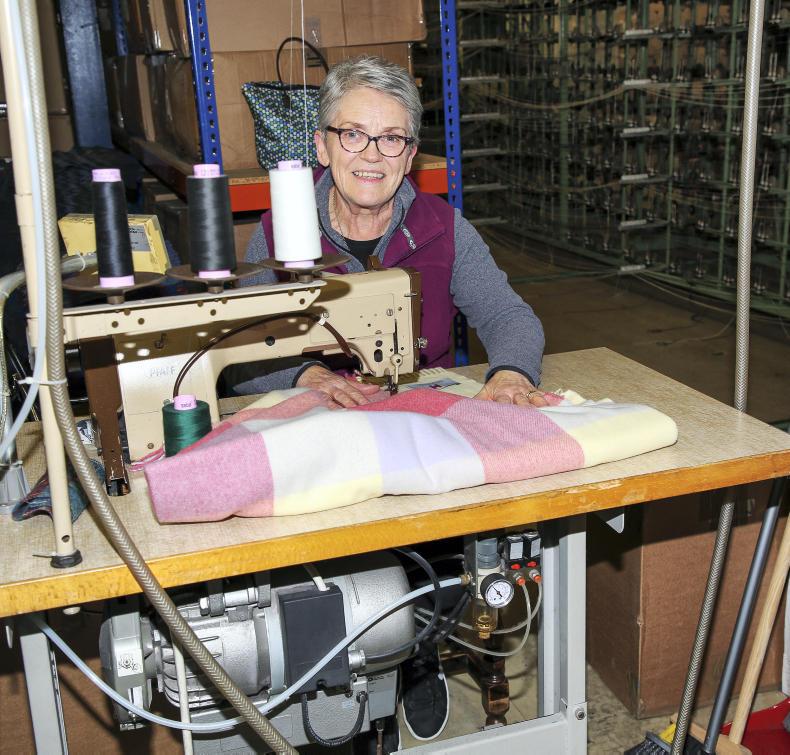
Mary Kelly adds the finishing touches to a woolen throw. \ Odhran Ducie
John Hanly & Company are a good example of a family-run business that has been able to successfully adapt its business model over the years, ensuring that the skills and workmanship at the mill continue for the next 100 years.
When driving around the backroads of Co Tipperary the last thing you’d expect to find is a busy working woollen mill. But 1km or so outside the village of Ballycommon you’ll come across the Ballyertella Woollen Mills which has been operating on the site since 1893. 
Brian Hanly is the fourth generation of the family to run the business which still carries the name of his great-grandfather – John Hanly and Co.
Key dates in the history of the mills include 1893 when Denis Hanly and his son John started spinning, weaving and finishing woollen products at the site alongside the River Nenagh. In 1910 they began exporting to the UK and Europe. In 1938 the original water mill was replaced with an electricity generating turbine.
Then in 1950 disaster struck when a fire destroyed much of the mill including its yarn-spinning facility.
“That was a defining point for the business. Up to then, we’d been an intake point for farmers from all over the country who sold us their wool. It took a lot of work to get that wool into shape for spinning and after the fire we stopped doing it,” says Brian.

The mill continued to weave various blends of fabrics for Irish and European manufactures and having survived two world wars, a great depression and much more, the pressure didn’t let up. Ireland’s accession to the EU in 1973 created a whole new set of challenges with mounting pressure from foreign imports.
“There’s probably no more than a dozen woollen mills in the country and each had to re-invent itself to survive,” says Brian.
Re-invention
In the case of Hanly’s that meant switching the focus of the business from fabrics to accessories. Not an easy thing to do when 80% of your business is weaving fabrics.

But they succeeded, and today the figures are reversed with 80% of business now coming from throws, scarves and headwear. The balance is in woven fabrics. A massive 99% of sales are business to business with 52% of sales coming from the Irish market and the balance from exports. They also sell through the factory shop and there’s value to be had with their annual sale which runs through the whole month of February.
Hanly’s only use wool and cashmere as their raw materials. They are sourced from suppliers who produce these materials in a sustainable and ethical manner.
Hanly’s continues to evolve and over the past 12 months has completed a rebranding of the look and feel of the business. That’s included a new website, logo, tags and labels. Photoshoots with the Tipperary landscape in the background and using local models all added to the authenticity and heritage of the product and business.

Fabric in the making. \ Odhran Ducie
Designers create each collection with its own weave, colour combination and patterns. The colours of this season have been duck-egg blue and baby pink woven in a herringbone pattern. The throws were hugely popular this year. “These throws in neutral pastels fit in with a modern style of living and create that cosy, comfortable and warm feeling which the Swedes call ‘hygge’.
“The US market is strong with the diaspora looking for an Irish feel to what they buy. The home tourist market look to bring home a memory of their visit and prefer plaid and check patterns.”
New challenge
Brexit is the latest challenge facing the business. “We are getting on with it. Sales were hit after the referendum as the confidence of independent UK businesses was shattered. 
It will be hard to see how a trade deal can be achieved by the end of the year. We can deal with VAT issues but it’s logistics, paperwork and customs that’s a worry,” says Brian.
In addition, all the fabrics produced at Hanly’s are finished and made ‘needle ready’ by an independent finisher in Scotland. “We dispatch fabric twice a week and it travels through Northern Ireland and Scotland and back again. How that is going to be treated by customs we do not know.”
But with almost 130 years of experience coping with wars, recessions and depressions behind them, Hanly’s won’t let a thing like Brexit get in the way of the history they still have to write.
Brian Hanly was aged just 24 when he came home to the business in 1985. “I was given a sort of ultimatum to return. My father needed one of us to help him run the business as he had suffered a minor heart attack. I was doing accountancy exams at the time and I well remember my boss saying to me, ‘You need to go home’. Dad’s commitment to the mill was unreal. He worked here until six months before his death at the age of 88 in 2013.”
But as is the case with so many who return home to farm, Brian was no stranger to the business. “Our family home was right beside the mill. I’d been in and out of the place from the time I was three years old. I did my homework in the office, spent most school and college holidays here. You wouldn’t get away with it now with all the health and safety regulations”.
Brian has three children who are all in their 20s and he is adamant that none of them will return to manage the mills out of a sense of duty or sentimentality.

“Returning home is open to any, all or none of them. It will be their decision, a decision they make with the full knowledge of the challenges facing the business. You have to be able to make a living and you are responsible for the livelihoods of 32 people. That’s a heavy responsibility.”
Super star support
Support for woven headwear can come from the most unusual sources. In the case of Hanly’s, it’s the likes of actor Cillian Murphy and how he is styled wearing their eight-piece woven cap on the hit series Peaky Blinders.
Hollywood heart throb Ryan Reynolds is a fan of Hanly’s quintessentially Irish ‘flat cap’. In a recent interview with the New York Times he said he’d had one for 15 years and still loves it. “My wife would kill me if I ever got rid of it.”
Many of the 32 people working in Hanly’s have been with the business for a very long time. Take Eileen McLoughney and Kathleen O’Connor who have been with Hanly’s for 42 and 40 years respectively. Both are menders, which involves picking up stray threads in the fabrics. God bless their eyesight.

Menders Elaine McLoughney and Kathleen O'Connor at work. \ Odhran Ducie
“Hanly’s has been good to me,” says Eileen who as well as mending does bespoke embroidery on commissioned pieces.
“I only live five miles away so it’s very handy.” Kathleen says it’s great to get up in the morning and have something to do, especially when it’s something you are good at.
Mary Kelly has worked with Hanly’s for 20 years and her job is to sew labels on to everything. “I live three miles away and it’s great to have work so close to home.” Other roles in the mills include weavers, warpers, menders, knotters, fitters, machinists and designers.
Mary Kelly adds the finishing touches to a woolen throw. \ Odhran Ducie
John Hanly & Company are a good example of a family-run business that has been able to successfully adapt its business model over the years, ensuring that the skills and workmanship at the mill continue for the next 100 years.













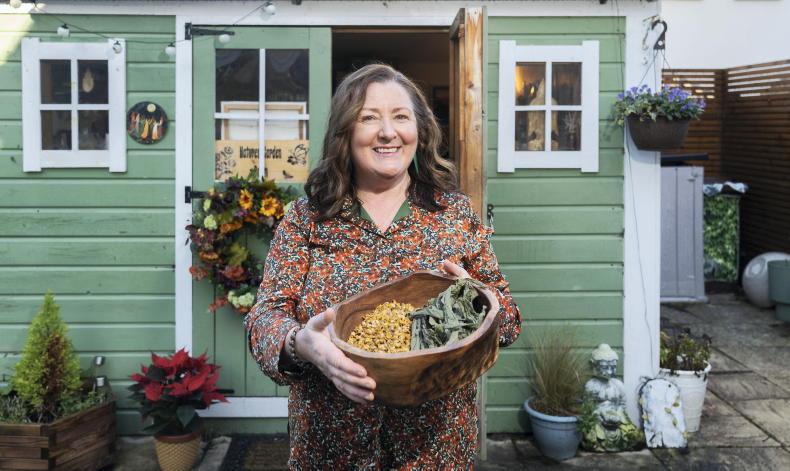
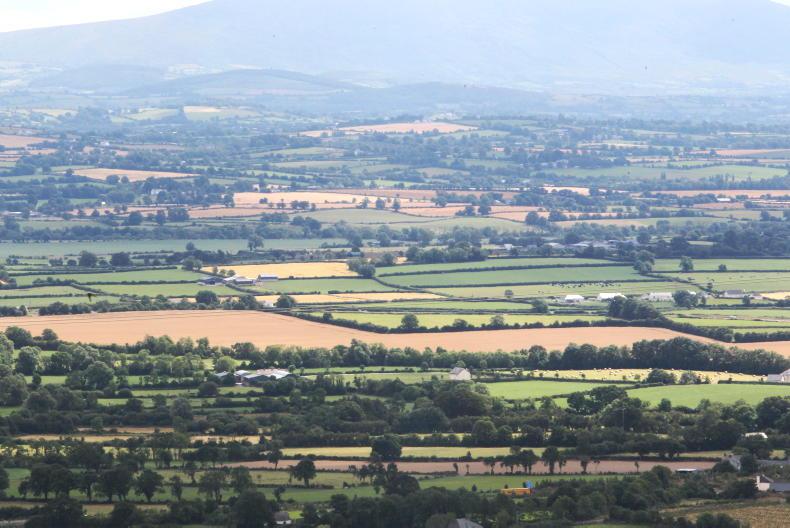
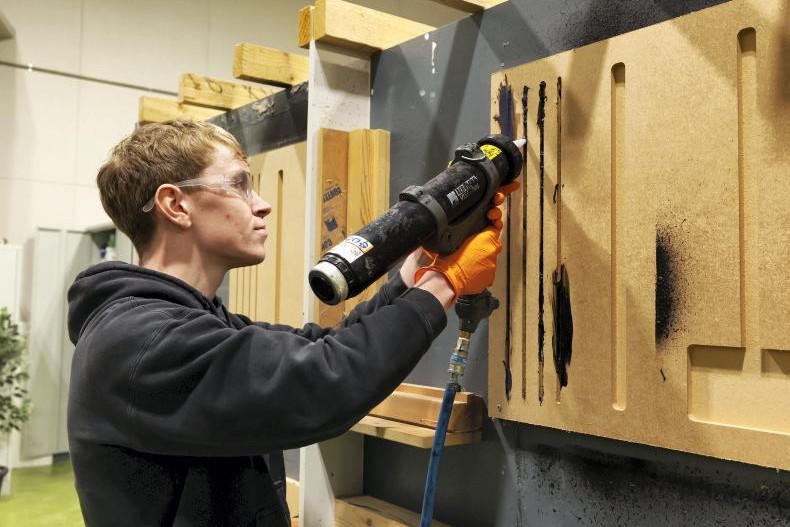
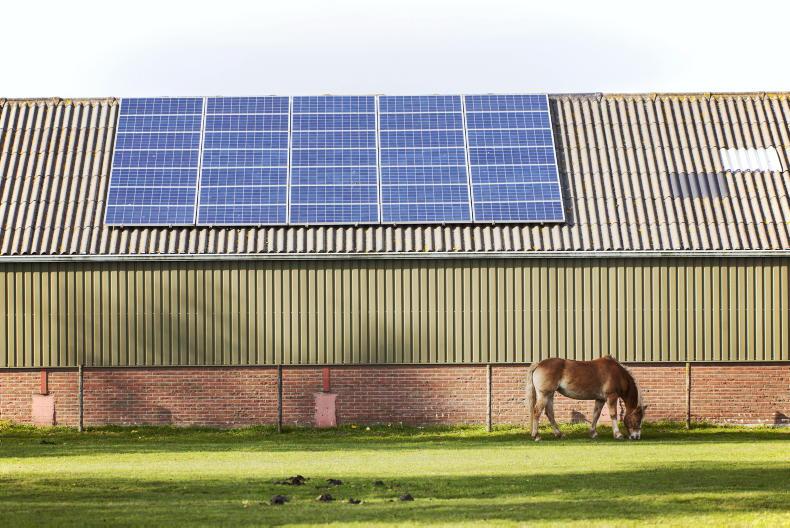
SHARING OPTIONS